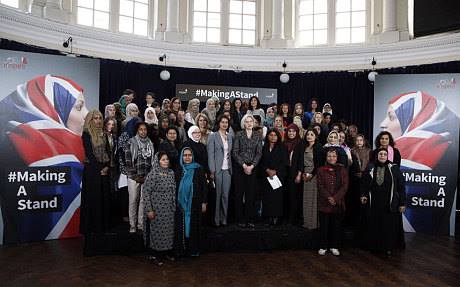A group of Muslim mothers, horrified at the prospect of their daughters running off to marry jihadi fighters, have launched a campaign to stop radicalisation via what they name as the real culprit: “Sheikh Google”. The Make a Stand campaign, launched in London this week, has the backing of Home Secretary Theresa May.
Around 60 young British women are understood to have abandoned their homes to marry ISIS fighters in Syria and Iraq. Many have moved to the Syrian city of Raqqa where they have risen to the top of the Al-Khanssaa Brigade, a sort of police force which enforces sharia law on the city’s streets. It is understood that some are using their privileged position to run brothels, forcing captured Yazidi women to work as prostitutes for male jihadis.
The campaign is designed to encourage people within the British Muslim community to “make a stand” against “extremists and radicalisers” by educating their children that “to be part of the so called Islamic State is the most un-Islamic thing you can do”.
“The biggest issue right now is the internet – it’s Sheikh Google,” Hifsa Haroon-Iqbal told The Telegraph at the campaign launch. “It is very important that we as women and as mothers stand out so that our children can hear our voices loud and clear. We are our children’s first teachers and we will always lead them on the right path and our voices need to be heard by them and by society at large.”
Khola Hasan, an assistant judge for the Islamic Sharia Council and a mum of four, agrees with the analysis: “I think a lot of these young people [who are being radicalised] aren’t communicating with their parents and their parents don’t know what they’re thinking. I can understand a little bit that young men want to join because they have a gun and can feel important.
“For girls, for them to want to be that bride, it’s almost Romeo and Juliet – it’s a weird fairy tale. They think, ‘There’s these lonely men. I’ll be this wonderful companion, and perhaps I’ll get to shoot a few people’. I think they need psychological help.”
Speaking at the launch event, home secretary Theresa May said “I truly believe that [as] women, as mothers, sisters and daughters, you have a unique and powerful role to play in helping to combat the extremist challenge here and abroad, and in taking lead to stop preachers of hate preying upon your young people.
“Challenging hatred and extremism is a job for all of us and we must challenge it wherever we find it. If as women in your communities you can exert influence, can create local support networks… then I and the Government will support you.”
The US government has also taken measures to counter online radicalism. Responding to ISIS’ masterful use of social media to recruit new members, the Think Again, Turn Away project is designed to show a different side of life as an Islamic militant. Many of ISIS’ videos portray victorious, glamourous images of fighters parading in US-made vehicles captured from the Iraqi military in images that have been described as being like tourism advertising campaigns.
However, the strategy has not met with universal approval. Shahed Amanullah, who last year left the State Department after helping establish programs to promote anti-extremist Muslim voices abroad, told The Guardian “I honestly don’t think the government should be in the position of directly engaging jihadis on Twitter. It’s a silly game.
“[The] tragedy of the US government’s attempts to engage online [is that] there’s nothing these people like more than to see the US government specifically acknowledging and interacting with them online. They turn right around to their followers and say, ‘See? We’re every bit as powerful as we say we are, the US government is proof.'”
However, Aisha Khan, a 20-year-old student at Goldsmiths University thought the British campaign was a good idea, saying “For young people post the age of 18, their parents need to talk to them. Young people, to be honest, don’t really watch the news or know what’s happening. But their parents should have conversations with them about it. The reality is we do have to talk about it or we’ll let ignorance prevail. If you don’t talk to your kids, you’re letting ignorance prevail – then everyone’s really shocked their child is going to Syria.
“All you can do is speak to your kids. Don’t brush it under the mat.”

COMMENTS
Please let us know if you're having issues with commenting.